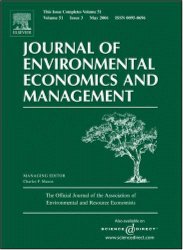Pollution & Health
Clean Power Plan Litigation Kick-Off
Flood of lawsuits follows publication of EPA rules to regulate power-plant GHGs
*Updated: Nov. 17, 2015* On Friday, October 23, 2015, the Federal Register formally published EPA’s rules to control greenhouse-gas emissions from fossil-fuel-fired power plants under the Clean Air Act. I described the basics of the rules after EPA released the unofficial text in August. The final text of the rule to regulate new and modified …
Continue reading “Clean Power Plan Litigation Kick-Off”
CONTINUE READINGDuPont Found Liable In First of 3,500 Lawsuits
Chemical Used in Teflon Linked to Numerous Health Problems, but its Use is Still Legal Under TSCA
Yesterday, a jury in the Southern District of Ohio found DuPont liable for a woman’s kidney cancer in the first of 3,500 suits the company faces. The cases all stem from DuPont’s use and disposal of perflourooctanoic acid (PFOA) or C8. The chemical is used to make Teflon, among other things, and the most recent …
Continue reading “DuPont Found Liable In First of 3,500 Lawsuits”
CONTINUE READINGLost in the Ozone Again
The Ozone Standard, Regulatory Pragmatism, and the Rule of Law
EPA issued a new regulation last week that mandates a reduction in ozone levels to 70 ppm from the current 75 ppm (originally set by the Bush Administration). The new regulation was immediately attacked by industry and environmentalists. According to industry, the regulation will be a job-killing burden on the economy. According to environmentalists, …
Continue reading “Lost in the Ozone Again”
CONTINUE READINGExploring Potential Challenges to EPA’s New Source Performance Standard: PART III
CCS for coal power plants, but not natural-gas power plants?
This post is the third in a mini-series (see first and second posts) exploring likely legal challenges to the New Source Performance Standard (NSPS) for power-plant greenhouse gas emissions under Clean Air Act § 111(b), and how those challenges might affect the Clean Power Plan. In my first post on EPA’s New Source Performance Standard …
Continue reading “Exploring Potential Challenges to EPA’s New Source Performance Standard: PART III”
CONTINUE READINGIs CCS the “best” system of emission reduction for coal-fired power plants?
Exploring Potential Challenges to EPA’s New Source Performance Standard: PART II
This post is the second in a mini-series (see first post) exploring likely legal challenges to the New Source Performance Standard (NSPS) for power-plant greenhouse gas emissions under Clean Air Act § 111(b), and how those challenges might affect the Clean Power Plan. In my first post on EPA’s New Source Performance Standard (NSPS) for …
Continue reading “Is CCS the “best” system of emission reduction for coal-fired power plants?”
CONTINUE READINGVolkswagen
What Does That Name Mean Now?
Stunning. But not shocking. That was my reaction to the massive fraud admitted by Volkswagen recently. Stunning in its sheer size and reach; half a million cars in the United States and another ten and a half million globally. Yet not very surprising given the fact that use of mechanical and digital cheat devices has …
CONTINUE READINGIs Carbon Capture & Sequestration (CCS) the Biggest Threat to the Clean Power Plan?
Exploring potential challenges to EPA’s New Source Performance Standard: PART I
This post is the first in a mini-series exploring likely legal challenges to EPA’s New Source Performance Standard (NSPS) for power-plant greenhouse gas emissions under Clean Air Act § 111(b), and how those challenges might affect the Clean Power Plan. I will leave detailed exploration of the Clean Power Plan for later posts, but suffice …
CONTINUE READINGAnti-CEQA Lobbyists Turn to Empirical Analysis, But Are Their Conclusions Sound?
Influential Attacks on California’s Environmental Impact Law Aren’t Supported By the Data
Every August, as the California legislative session comes to a head, lobbyists attempt to gain support for dramatically scaling back California’s landmark environmental law, CEQA (the California Environmental Quality Act). This year was no exception. Last month, the law firm Holland and Knight, which has been a leading force on this issue, issued a new …
Continue reading “Anti-CEQA Lobbyists Turn to Empirical Analysis, But Are Their Conclusions Sound?”
CONTINUE READINGThe Coal Export Wars Reach Oakland
In seeking an alternative route to Asian markets, coal’s path from Utah to China via Oakland hits a snag
Expanded west coast infrastructure to support the export of western U.S. coal to Asian markets has long been part of the business plans for some of the nation’s largest coal producers. However, attempts by Powder River Basin coal interests to construct or expand coal export terminals in Washington and Oregon in recent years have been …
Continue reading “The Coal Export Wars Reach Oakland”
CONTINUE READINGWhat’s New in Environmental Economics?
Some interesting recent publications.
It sometimes takes awhile for journals to reach my desk as they circulate among faculty, so this isn’t hot off the presses. But I’ve been looking at some recent issues of JEEM (the Journal of Environmental Economics and Management), and I found a number of very interesting articles. Fully grasping the articles would require a …
Continue reading “What’s New in Environmental Economics?”
CONTINUE READING










